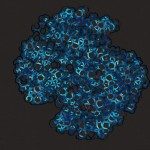Lien vers Pubmed [PMID] – 17293430
J. Bacteriol. 2007 Apr;189(8):2976-87
The small regulatory protein Crl activates sigma(S) (RpoS), the stationary-phase and general stress response sigma factor. Crl has been reported to bind sigma(S) in vitro and to facilitate the formation of RNA polymerase holoenzyme. In Salmonella enterica serovar Typhimurium, Crl is required for the development of the rdar morphotype and transcription initiation of the sigma(S)-dependent genes csgD and adrA, involved in curli and cellulose production. Here, we examined the expression of other sigma(S)-dependent phenotypes and genes in a Deltacrl mutant of Salmonella. Gene fusion analyses and in vitro transcription assays indicate that the magnitude of Crl activation differs between promoters and is highly dependent on sigma(S) levels. We replaced the wild-type rpoS allele in S. enterica serovar Typhimurium strain ATCC 14028 with the rpoS(LT2) allele that shows reduced expression of sigma(S); the result was an increased Crl activation ratio and larger physiological effects of Crl on oxidative, thermal, and acid stress resistance levels during stationary phase. We also found that crl, rpoS, and crl rpoS strains grew better on succinate than did the wild type and expressed the succinate dehydrogenase sdhCDBA operon more strongly. The crl and rpoS(LT2) mutations also increased the competitive fitness of Salmonella in stationary phase. These results show that Crl contributes to negative regulation by sigma(S), a finding consistent with a role for Crl in sigma factor competition via the facilitation of sigma(S) binding to core RNA polymerase.

